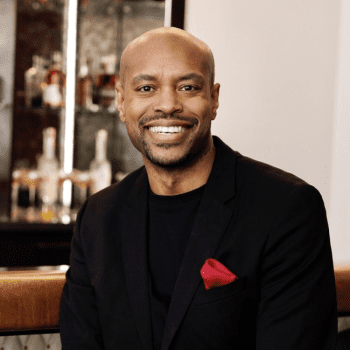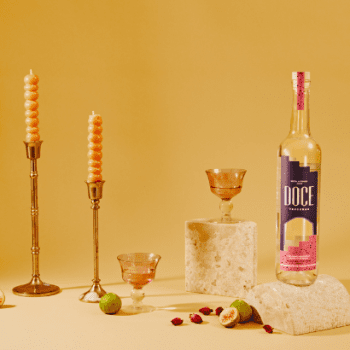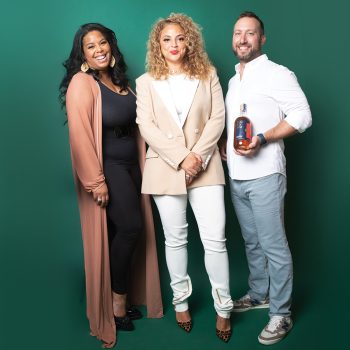Pronghorn president: ‘Equity is driven by economics’
Ron Cole stepped into the president role at US incubator Pronghorn in December last year. He shares why diversity is closely tied to economic success, his targets to help further Pronghorn’s work, and whether an equitable industry is possible without dedicated diversity, equity and inclusivity programmes.

Pronghorn’s mission is clear: to cultivate the next generation of Black founders and leaders in the spirits industry. In December last year, the independent company welcomed Ron Cole into the fold as president to further its growth.
Pronghorn launched in 2021 as a 10-year initiative to drive diversity, equity and inclusion in the spirits industry. By 2032, its goal is to have invested in 57 Black-owned spirits brands, which it calculates will create US$2.4 billion in economic value.
While the co-founders of Pronghorn – Dia Simms, Erin J Hall and Dan Sanborn – all come from experienced spirits backgrounds, Cole, a born-and-bred New Yorker, brings a fresh perspective to the business.
“I’ve evolved into the [spirits] category from a consumer perspective,” he says. “I think that was a little bit attractive for the board.
“After playing some sports in college and doing a bunch of things, I ended up in the consumers goods industry. And for the last 20-plus years, I’ve had the chance to work with some amazing people and some amazing brands, and really figure out a way to create value between suppliers, retailers and consumers. That’s my jam. That’s what I enjoy. That’s what I’ve learned to be pretty efficient and successful in doing, and a lot of that was learned through a number of different organisations that I worked with.”
His longest stretch was with Nestle, and he shares the following analogy to explain his point further: “When 70% of America basically has a dog or a cat in their household, you get a chance to really start learning how to understand consumers and being consumer obsessed. And that’s how I built the start of my career. It was with Nestle, just being so inundated with understanding consumers and being curious, building brands.”
Additional experience came from Cole’s time working for Kerry Foods, and Reckitt. Cole is confident his experience in building brands and connecting them to consumers will stand him in good stead at Pronghorn. “When you know how to understand consumers and how to think about and build brands, and make that connection, whether it be through storytelling, whether it be through product quality, whether it be through trends that are happening, whether it be generational or cultural or price point or premiumisation, when you understand that, I think you can morph into any category,” he adds.
Simplifying to drive change
A key target he’s eager to get started on is helping Pronghorn do what it does even better. And to this, he asks three simple questions: “How do you simplify your mission, simplify your choices, and simplify your actions? That is an area I’m really driving towards our organisation. One of the things we stand on is being heart-led, but math-based.
“I think that’s one of the biggest things, helping the organisation simplify and drive our actions because we have a small team and minimal resources, so we’ve got to be incredibly efficient. Everything we do is driven by how we invest in these companies and how we help them be successful. That success is driven by how successful our people are.”

Second on his agenda is the all-important brand building. Recent investments by Pronghorn have included Shinju Spirits in 2024, which became the first Japanese whisky producer to receive an investment from the company. Pronghorn has also backed Ten To One rum, co-owned by singer Ciara, women-founded Acquired Taste Cognac, New England Sweetwater Farm & Distillery, Rally Gin, and Black woman-owned non-alcoholic drinks brand Mocktail Club. Last week, Pronghorn invested in New York-based Doce Mezcal, marking its first foray into the category.
“Consumers want authenticity,” says Cole. “They love a good story. They want you to be reliable. They want you to be doing good things for the planet, good things for society. And they want a great experience when they’re entertaining or sitting at home and having a beverage. So, how do you connect that with these founders who have dreams? Bringing all that together are things that I think are very transferable [skills], and things I’ve done in my past. I’m thrilled; I’m excited to be part of this.”
In February, Pronghorn made its first move away from brand investment and towards brand establishment with the launch of Edmond’s Honor Bourbon. The liquid was created by Tracie Franklin and pays tribute to Edmond Albius, a Malagasy botanist prodigy who revolutionised vanilla cultivation by hand-pollinating orchids. Growing the brand “from the ground up” will be a key focus for Cole and his team this year.
“The whole point of Pronghorn in general is building a template, building a template of value that can diversify any industry,” Cole explains. “We’re starting in spirits. But that’s not our only ambition. As we launch our first brand, we’re building a blueprint for how you take something from zero and really drive it forward. And we’ve got a team that’s dedicated to doing that.”
Also of importance will be forging “value-driven relationships” with people in the industry, from entrepreneurs to those seeking employment in the sector. Cole stresses the importance of establishing diverse teams in business. “It allows companies to connect with consumers in different ways, to understand communities differently,” he says. “I want to see us do more in the hospitality space, more partnerships with some of the HBCUs [Historically Black Colleges and Universities], and things we’ve done thus far. Let’s start talking about bartending schools. Let’s start talking about hospitality programmes.
“Lastly, I’d say we have this portfolio of investments. How can we continue? We call it supercharging, which is when we come to an investment we’ve made and we say, hey, we’ve analysed your business. We’re going to put you through this supercharging process to help you advance your business with value and whatever your goals may be, hopefully for some of them to have an exit.”
Diversity, equity and inclusion has been more frequently talked about in recent years. In 2024, however, the topic hit headlines again after a leaked email revealed Jack Daniel’s owner Brown-Forman would be scrapping its corporate diversity, equity and inclusion programmes. Explaining its reasons, Brown-Forman stressed in its email: “We will continue to foster an inclusive work environment where everyone is welcomed, respected, and able to bring their best self to work.”
Is equity possible without DEI schemes?
How significant are moves like this? And what makes DEI-dedicated schemes so important to improve diversity and to help businesses grow?

“Equity is driven by economics,” says Cole. “Every initiative, whatever platform you’re on, there’s going to be an economic benefit to it. We believe equity is driven by economics and diversity delivers. There are a number of studies that have shown it. One of the ones that comes to mind for me is a McKinsey [and Company] study that talked about at the executive level, the more diverse – whether it be gender-based, cultural-based – over the course of the last 10/12 years, those companies outperform the market.
“Why? One, you get to understand different cultures and perspectives, you get to understand different backgrounds, you get to tap into different ways that consumers think. You get to listen better. One of the things I’ve found having worked with people who might have English as their second language, is you start realising I need to simplify. I’ve gotten better because I’ve been able to simplify. I’ve got to understand to some of the cultural narratives that are happening because it allows me to be a better human being. And many of these initiatives, which in many cases are about how you help someone feel like they belong, help people show up at work better. When you’re satisfied at work, results are better.”
But is it possible to achieve DEI goals without specific programmes in place?
“What I would say is this: I think sometimes how we all define things can sometimes get in the way of what we actually do. I think some of these organisations are trying to figure out what are the things that allow us to drive better connective tissue, better joy and satisfaction, and better inclusion within our employees that lead to better results. And they’re trying to figure that out.
“Especially for companies that are selling products to consumers, America is just getting more diverse. We believe diversity delivers and I think over the course of time, even in a short, kind of interesting time that we’re in right now where everyone’s trying to figure it out, I’m confident we’re going to figure it out, and we’re going to be a voice for positivity, and I think a lot of others will join.”
Related news
Encouraging diversity in the drinks industry
